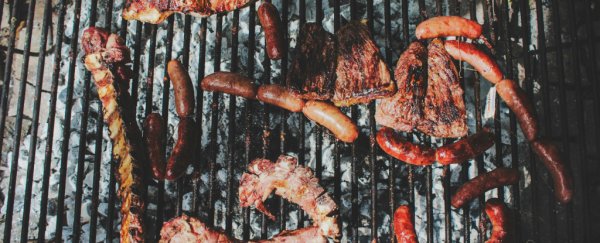There's already an established link between eating red meat and a higher risk of cancer. Now a study on the CMAH gene has revealed how this link came to be, and could even help us figure out which types of meats are most risky to eat.
CMAH is responsible for synthesising the sugar molecule Neu5Gc, present in red meat, as well as some fish and dairy products. In humans, the CMAH gene is mutated, which means our bodies don't produce Neu5Gc.
When we consume meat or other products containing this sugar, it can trigger an immune response to the foreign substance: and that reaction in turn can trigger inflammation, arthritis, and even cancer.
However, until now, we've only known about a handful of animal species that produce Neu5Gc.
In an attempt to learn more, scientists from the the University of Nevada in Reno analysed 322 animal genomes and plotted them on an evolutionary chart, trying to identify when CMAH was deactivated in certain species.
"In a first analysis we scanned all the available genomes," says lead researcher David Álvarez-Ponce.
"We only found the gene in a few bacteria, in a pair of algae, and in the deuterostomes, a group of animals that includes vertebrates and echinoderms, among others."
One of the study's findings was small amounts of Neu5Gc sugar in the meat of fish with the CMAH gene, but high levels of the sugar in the caviar of these fish. That might be because the gene is expressed specifically in the fish eggs or oviducts.
"It turns out that caviar, one of the most expensive meals in the world, is also one of the products with the highest concentrations of Neu5Gc," says one of the team, Sateesh Peri.
However, the research also turned up plenty of fish without the CMAH gene, whose caviar should be Neu5Gc-free.
Another surprising result was the presence of the functional CMAH gene in one species of lizard, the Carolina anole. The gene was previously thought to be absent in all reptiles, having been lost somewhere way back in the evolutionary tree.
While the research doesn't change much about specific diet recommendations today, we now have much more background information on CMAH, and the evolutionary pressures on it.
Scientists think the gene's deactivation may have protected us against some diseases, such as a type of malaria that can still infect chimpanzees and gorillas.
Animal species with the gene may have meat that has the same carcinogenic properties as red meat, and which could cause other health problems in humans – though further research is going to be required to figure all this out.
Further down the line, researchers can use this study for further investigation into nutrition, medicines, and even animal organ transplants or xenotransplantation: using tissues and organs from other animals in humans without an adverse reaction.
"To determine in which groups and at what moments of the evolution the CMAH gene has been deactivated is critical to know which species are most likely to contain the toxic Neu5Gcy sugar, which are recommended for feeding, xenotransplantation, and certain scientific studies," conclude the researchers.
The research has been published in Genome Biology and Evolution.
